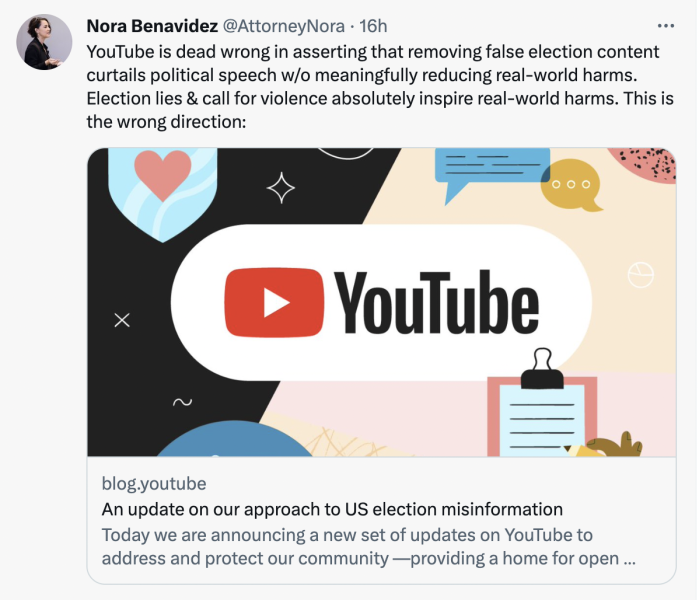YouTube has announced that it will stop removing videos that make false claims that the 2020 US elections were stolen, erroneous, or had glitches in a reversal of its election misinformation policy which took effect yesterday.
YouTube’s Policy Shift
In December 2020, YouTube put in place a policy that prohibited content that displayed voter oppression, incitement to interfere with democratic processes, spread false claims about candidate eligibility or election integrity or distributed hacked documents of democratic processes.
The policy was set to apply to the 2021 German Federal election, the 2014, 2018, and 2022 Brazilian Presidential elections, and the previous US elections up until 2020. As a consequence of the policy, any content found in violation would be removed from the platform and after the removal of three videos, the responsible channel would be terminated.
Since the effect of the policy, Youtube reported to have removed tens of thousands of videos and felt it was time to “reevaluate the effects of this policy in today’s changed landscape”. The company stated that while the act of removing videos was to protect the community, it was also closing doors on open discussions and debates on the topics.
The video-sharing platform said in a statement:
“In the current environment, we find that while removing this content does curb some misinformation, it could also have the unintended effect of curtailing political speech without meaningfully reducing the risk of violence or other real-world harm.”
As such, the video streaming platform announced that it would stop removing content that “advances false claims that widespread fraud, errors, or glitches occurred in the 2020 and other past US Presidential elections.”
The reversal, which does not apply to the German and Brazilian elections, was met with a lot of criticism by anti-misinformation advocates. One such advocate, Nora Benavidez, from the nonpartisan group Free Press, said, “YouTube is dead wrong in its assertion that removing false election content curtails political speech without meaningfully reducing real-world harms.”
She termed the decision as “dangerous” adding that it must be reversed immediately as it allows false claims to continue to “sow hate and disinformation that threatens our democracy”.
According to Julie Millican, vice president of the socialist advocacy group Media Matters, “YouTube was one of the last major social media platforms to keep in place a policy attempting to curb misinformation about the 2020 election.”
“Now, it’s decided to go the simple route by allowing individuals like Donald Trump and his supporters to continue lying about the 2020 elections without repercussion,” she added.
Misinformation vs. Freedom of Speech
However, in an attempt to prevent such content from being promoted, Youtube has instead said that it will ensure that when users visit the platform for information concerning elections, they will be presented with content from authoritative sources prominently in search and recommendations.
Additionally, the platform will keep up its enforcement of the regulations prohibiting users from sharing content that prevents others from voting. It will also take action against material that challenges the legitimacy of mail-in voting and attempts to mislead people about the date, location, or prerequisites for voting.
YouTube is a representation of other media platforms and tech companies that are struggling to find a balance between curbing misinformation and enhancing freedom of speech and expression ahead of the 2024 election.
Up until now, finding the ideal balance has been challenging especially since in preparation for the 2024 election, former President Donald Trump and other elected leaders have emphasized election denialism in their political agendas.
For instance, CNN faced harsh backlash after its town hall interview with Trump last month. Despite the moderator’s best efforts to fact-check Trump in real time, Trump frequently promoted unverified conspiracies about the 2020 election being “rigged” during the event.
Related articles:
- Best Netflix VPN
- Maryland School District Sues TikTok, Google, and Meta For Their Roles In the Mental Health Crisis
- Meta Announces 24 New Games For Quest Headsets Including Assassins Creed and Ghostbusters
What's the Best Crypto to Buy Now?


